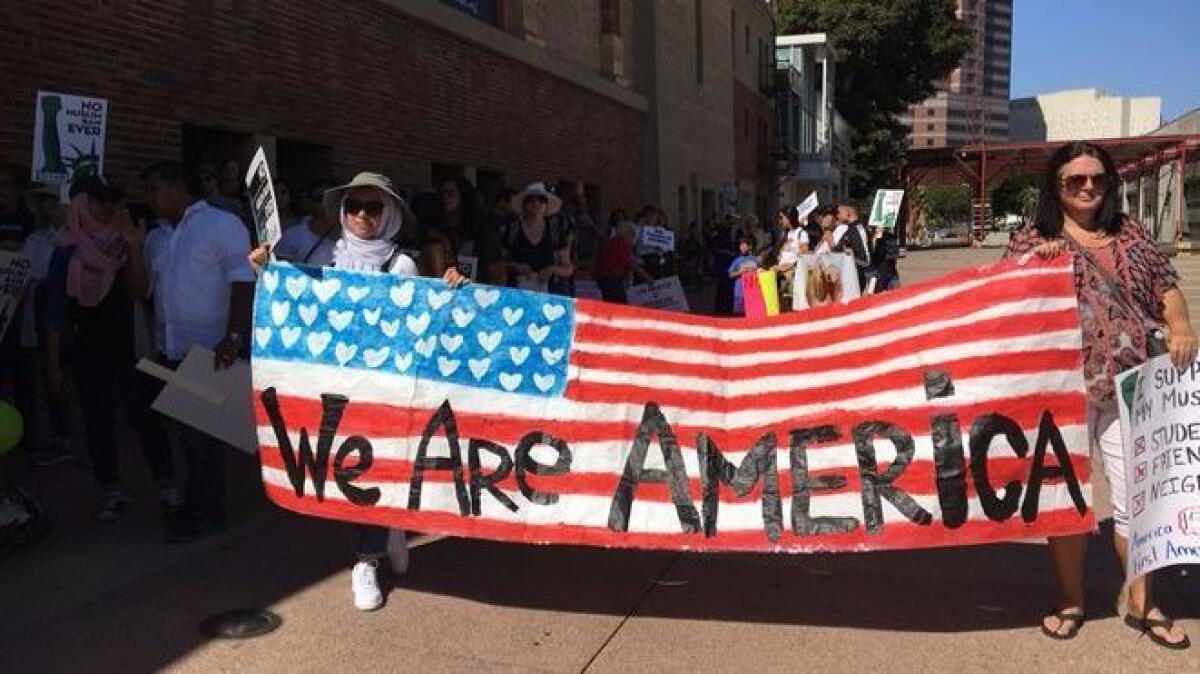Protesters take to the streets to oppose Trump’s travel ban 3.0

- Share via
Muhammad Al-Muwadda stood in front of the Federal Building in downtown Los Angeles on Sunday, clutching a sign that said “Muslim Ban Survivor.”
He and his American-born wife had recently moved to the United States from Yemen, but the journey had not been easy.
After a civil war broke out in Al-Muwadda’s homeland in 2015, the couple moved to Jordan and waited more than a year and a half for him to get cleared to join his wife’s family in Pasadena.
He finally got his immigration papers in December. Then Trump’s original travel ban struck.
“After waiting a year and seven months, they said we hadn’t been vetted and screened enough,” he said. “If it wasn’t for that courageous judge in Seattle, we wouldn’t be here.”
Now, they were joining a march organized by the Council on American-Islamic Relations (CAIR) and other groups to protest what’s been called “Muslim Ban 3.0,” slated to go into effect Wednesday.
Trump’s new ban is indefinite and includes restrictions on travel to the U.S. by nationals from seven countries. The order covers most of the same countries subject to the original travel ban, with Chad and North Korea joining the list of Iran, Syria, Yemen, Somalia and Libya. Sudan has moved off the list.
“This is very personal for us,” said Lucinda Wills, Al-Muwadda’s wife of 30 years. “We want to support this movement, and we want to say thank you.”
The march, dubbed “No Muslim Ban Ever,” began around 1 p.m. at the Japanese American National Museum in Little Tokyo.
The location was symbolic.
“It is so meaningful we are here, considering what happened to our Japanese brothers and sisters during World War II,” said Asmaa Ahmed, CAIR-LA public policy and advocacy coordinator. She was referring to the time in 1942 when the federal government imprisoned Japanese Americans after declaring war on Japan.
Addressing a crowd of a few hundred people, Rick Noguchi, chief operating officer of the national museum said that Japanese Americans know all too well what racial hysteria looks like.
“We will stand up for any group targeted for biased and unjust treatment,” he said.
Kanji Sahara, a civil rights activist and former internee, left the crowd with these words: “Never again.”
Watching the talks from the relative cool of a shady corner was Pini Herman, who was wearing a white T-shirt with the names of the countries included in the original travel ban written in large block letters across the front.
Herman said he is an immigrant himself. His parents were Holocaust survivors who brought him to the United States when he was 4 years old.
He heard about the event through his work with One LA — a network of religious and nonprofit organizations in the Los Angeles area where he works on the refugee and immigrant task force.
“My parents came here because of the kind of country America is supposed to be,” he said.
After the march got underway, protesters followed a flatbed truck decorated with crepe paper through the streets of downtown Los Angeles.
The chanting was led by Mirvette Judeh, vice chair of the Arab American Civic Council who was dressed in an American flag hijab, cowboy boots and heart-shaped glasses.
At the Roybal Courthouse on Temple, Giselle O’Reilly, a seventh-grade teacher from Riverside County, leaned a sign against a wall and took a quick breather. (It was a hot day for a march.)
She said she started fighting for Muslim rights even before the 2016 election, after noticing that some of her Muslim students felt afraid to walk down the street.
“I’m here because I want to have a voice,” she said. “Not an angry voice. Just a voice.”
More to Read
Sign up for Essential California
The most important California stories and recommendations in your inbox every morning.
You may occasionally receive promotional content from the Los Angeles Times.














